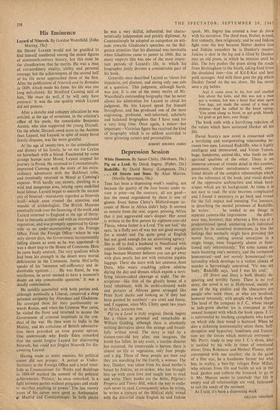His Eminence
SIR HENRY LAYARD would not be gratified to find himself numbered among the minor figures of nineteenth-century history, but this must be the classification that he merits. He was a man of extraordinary vitality, ability and personal courage, but the achievements of the second half of his life never approached those of the first. After the publication of Nineveh and its Remains in 1849, which made his fame, his life was one long anti-climax. Sir Stratford Canning said of him, 'He • must do well if he will only have patience.' It was the one quality which Layard did not possess..
After a sketchy and unhappy education he was articled, at the age of seventeen, in the solicitor's office of his uncle, the remarkable Benjamin Auste'n, who also supported the young Disraeli. On the whole, Disraeli owed more to the Austens than Layard, but Layard, in spite of many fierce family disputes, was the more grateful.
At the age of twenty-two, to the astonishment and dismay of his family, he set out for Ceylon on horseback with a friend. Fascinated by some strange humps ,near Mosul, Layard stopped his journey in Persia. He returned to Constantinople, impressed Canning with the story of his extra- ordinary adventures with the Bakhtiari tribe, and eventually returned to Mosul at Canning's expense. With hardly any• money, dwelling in a wild and dangerous area, relying upon unskilled local labour, Layard began to unearth the ancient city of Nimrud—mistakenly regarded as Ninevah itself—which soon riveted the attention and wonder of archieologists. The British Museum eventually took over the financing of the work, and Layard returned to England at the age of thirty- four to fantastic acclaim and with an international reputation, and was promptly appointed by,Gran- • ville to an under-secretaryship at the Foreign Office. From the Foreign Office—where he was only eleven days, the Government inconveniently falling almost as soon as he was appointed—it was a short step to the House of Commons. Here he came badly unstuck. The very qualities which had been his strength in the desert were mortal deficiencies in the Commons. Justin McCarthy speaks of his 'immense self-sufficiency and in- domitable egotism. . . . He was fluent, he was vociferous, he never seemed to have a moment's doubt on any conceivable question.' It was a deadly combination.
He quickly quarrelled with both parties and, although nominally a Liberal, conceived a deep personal antipathy for Aberdeen and Gladstone. He scourged them for their pusillanimity to- wards Russia, and when the Crimean War came, he visited the front and returned to accuse the Government of criminal ineptitude in the con- duct of the war. He then went to India in the Mutiny, and his criticisms of British adminstra- tion there provoked an even greater uproar.
One understands why Emily Eden remarked that she could forgive Layard for discovering Nineveh, but could not forgive Nineveh for dis- covering Layard.
Having made so many enemies, his political career did not prosper. A period as Under- Secretary at the Foreign Office and a brief inter- lude as Commissioner for Works and Buildings in 1868-69 marked the summit of his political achievements. 'Politics,' he once remarked, 'is a fight between parties without prinpiples and ready to sacrifice anything to power.' The last twenty years of his career were spent as Ambassador at Madijid and Constantinople. In both places
be was a very skilful, influential, but charac- teristically independent and prickly diplomat. At Constantinople he adopted so outspoken an atti- tude towards Gladstone's speeches on the Bul- garian atrocities that his dismissal was inevitable when Gladstone came to power in 1880. But in many respects this was one of the most impor- tant periods of Layard's life, to which his biographer justly devotes a considerable part of his book.
Granville once described Layard as 'clever but impulsive, not discreet, and seeing only one side of a question.' This judgment, although harsh, was just. It is one of the many merits of Mr. Waterfield's outstanding biography that he never allows his admiration for Layard to cloud his judgment. He lets Layard speak for himself throughout, and has produced one of the most engrossing, profound, well-informed, scholarly and balanced biographies that I have read for a very long time. Once again, a minor—but important—Victorian figure has received the kind of biography which is so seldom accorded to more glittering careers and personalities.
ROBERT RHODES JAMES






































 Previous page
Previous page